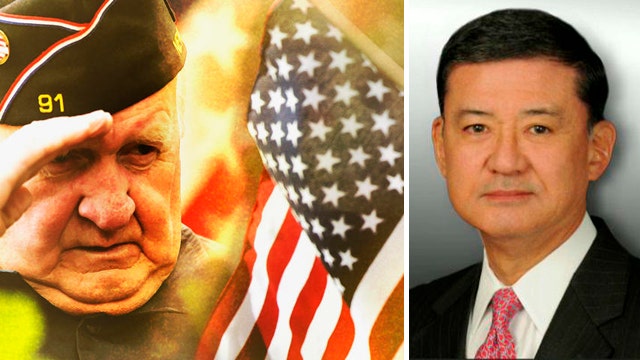American Legion calls on VA sec'y to resign amid scandals
Former Secretary of Veterans Affairs Anthony Principi reacts
My late father was a WWII and a Korean War combat veteran who retired as an Army master sergeant. I would often hear him say that the best officers were the ones who “took care of their troops.”
The mission of the Department of Veterans Affairs (VA) is to “take care of the troops” by providing them with the benefits that the men and women who served our nation in uniform, and who were often required to make tremendous sacrifices in defense of our freedom, have earned.
Since January of 2013, I’ve served as the chairman of the House Veterans’ Oversight & Investigations Subcommittee, which is tasked with the oversight responsibility of making sure that the VA meets all of our nation’s obligations to our veterans.
[pullquote]
Unfortunately, I’ve been shocked and disappointed at the systemic failures of the VA, impacting everything from delays and cost overruns at major VA medical construction projects to glaring patient safety problems resulting in preventable deaths and even to the inability of the VA to resolve the tremendous backlog of veterans’ disability claims in a timely manner.
In almost every instance when a problem has arisen, the response by Secretary Shinseki, assuming that he publicly expresses one at all, is almost always defensive.
If anything, he appears bothered by the unending criticism facing his department, not by how the lives of our veterans and their families, whom he is sworn to serve, have been impacted by problems within the VA.
He seems far more interested in serving the needs of VA bureaucrats than he does about meeting the needs of our veterans and their families. There is simply no problem that is too great to devise an excuse for or to simply try to explain away.
I’ve never heard Secretary Shinseki say, even when the evidence of mismanagement is overwhelming, “the way veterans are being treated by the VA is outrageous, this is unacceptable, it’s got to stop, and I’m going to hold those at the VA who are responsible for this accountable for their actions.”
Senior managers in the VA, under his so-called "leadership," are never fired or even disciplined for misconduct, negligence, or simply poor performance.
The leadership of the VA never claims to be aware of any problems themselves until they have been made public by either whistleblowers from within the VA, from the work of Veteran Service Organizations (VSO’s), or from the investigations conducted by my subcommittee.
Secretary Shinseki owes his resignation to the same men and women who served under him in the U.S. Army because he has failed so miserably to “take care of the troops” who are no longer on active duty but who are now under the care of the VA.
If the VA was a military organization run by the same standards that General Shinseki demanded of his subordinates leaders during his service in the U.S. Army, he would have been relieved of his command a long time ago for his failure to effectively provide leadership.
I followed my late father’s footsteps and enlisted in the U.S. Army as soon as I was old enough to serve. As a young soldier, I can remember the motto that was inscribed over the entrance to our barracks; it read “Lead, Follow, or Get Out of the Way.”
As a former soldier, I respect Secretary Shinseki’s military record of leadership during his career in the U.S. Army but he has not been effective in leading the VA, a large civilian organization, and it is now time for him to “Get Out of the Way” by resigning.

